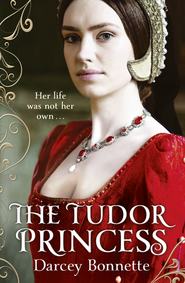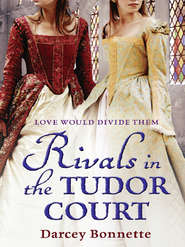По всем вопросам обращайтесь на: info@litportal.ru
(©) 2003-2025.
✖
Betrayal in the Tudor Court
Настройки чтения
Размер шрифта
Высота строк
Поля
Father Alec lowered his eyes, his face paling. “Yet we must remember that everyone, no matter how … misguided you believe their faith to be, deserves to be treated with compassion. Remember, Lady Mirabella, God is our only judge. You—know that, don’t you, my child?”
Mirabella offered a fervent nod.
Father Alec drew in a breath, running a hand through the chestnut waves that grazed his shoulders. “Well, I think that is enough for today. It is beautiful outside—perhaps you should all take some exercise.”
As the children filed out of the room Cecily lingered. She was not like Mirabella; she did not want to talk to God all the time and could not imagine life cloistered away from the world. Yet religion concerned her. She remembered Mistress Fitzgerald’s claim that Henry VIII had invoked the wrath of God for loving the heretical Anne Boleyn. She recalled bits of conversations at Burkhart Manor, her parents discussing something called the New Learning. They spoke of it in hushed voices, sustained with excitement. They did not speak of it with malice, as though it were a plague to fight. They spoke of it with hope lighting their eyes.
But to Mirabella the New Learning encompassed all that was evil. It was an enemy with which to do battle and God was mustering His soldiers.
“Father,” Cecily asked after the other children had left, “is the New Learning evil?”
“There are those of authority who think so,” Father Alec replied in gentle tones as he knelt before her. He studied the child’s face, a face wrought with sincerity and kindness. A face that he enjoyed greeting, a face that could be tear streaked from tragedy but instead chose to meet each day with sparkling eyes and a bright smile.
“But what is it?” Cecily persisted.
Father Alec searched for a simplified explanation. “It means different things to different people, but the central theme is the belief that the Church should be reformed. That the wealth in the monasteries and churches should be dispersed among the people, that sin should not be expiated by paying indulgences—that is, paying the clergy for forgiveness—that church officials in power should not give offices to family members even if they are undeserving … There are many things, complicated things—”
“But they all make sense!” Cecily cried with a smile. “Why would people think that is evil when they just want to make things fair?”
“That, too, is complicated, little one,” he told her, touched by her innocent summation of the situation. “Many people do not like their authority questioned, even if the suggestions seem reasonable. People fear change and those benefiting from the way things are now will no doubt fight to keep them that way.” He sighed. “It is dangerous even discussing the New Learning, Lady Cecily, and you would do well not to speak of it to anyone but me. People, like Martin Luther, have been excommunicated for their beliefs and began what some would call renegade sects of their own. They are the lucky ones; others have even been put to death.”
He watched the teal eyes grow round; the alabaster face paled to match the falling snow. “What do you believe, Father?”
Father Alec paused. He reached out to tuck a stray rose-gold lock behind her ear. “I will tell you. I believe in God the Father Almighty, maker of Heaven and earth. …”
Cecily smiled.
“Come now, my little theologian, let us to the outdoors!” he cried, sweeping her up in his arms. “I believe there is a pony waiting for its mistress.”
Cecily snuggled against his chest, all thoughts of the Church forgotten as she anticipated riding on the snow-covered trails of Sumerton Forest with Father Alec and the children.
Father Alec had not forgotten, however. For the rest of the day his thoughts were dominated by Cecily’s questions. He prayed that none would accuse him of leading her in a direction most would consider to border on heretical. On the heels of these thoughts was the knowledge of his own beliefs, beliefs harboured within the deepest recesses of his heart.
He thought of Tyndale’s English Bible, hidden in a chest in his chambers along with other forbidden texts.
He trembled.
He must be careful.
2 (#ulink_1afb31bc-e784-5d9b-94b4-1afc0e26e149)
It was Christmastide when Mirabella took Cecily to see her cherished convent, Sumerton Abbey. Together, dressed in thick otter fur-lined cloaks, they trudged through the snow-covered trails through Sumerton Forest to the Benedictine convent that bordered the eastern edge of the Pierces’ vast estate. Beneath a canopy of sparkling tree branches they walked and chattered, their voices tinkling like the icicles that chimed in the crisp breeze. Mirabella patted at the heavy pouch of ducats on occasion. The large donation her father sent with each visit was safe, snug in the pocket of her gown.
Preparations for Christmas were being made when they arrived. Pine boughs were being strung about the chapter house and all throughout women’s voices were raised in song, their harmonies swirling, filling up the breadth and height of the little chapel, which was lined with stained-glass windows and outfitted with statues of female saints.
Mirabella took Cecily by the hand, leading her throughout the cloister, introducing her to the sisters, who offered warm, cheerful welcomes. All the sisters loved Mirabella and it was with them she felt most at home. Unlike her own mother, who was caught up in running Castle Sumerton along with planning the endless entertainments for her illustrious friends, these gentle women always had time for her. They listened to her. They soothed her.
The two girls approached the altar to light candles and pray before they would join in the decorating. Mirabella cast an adoring face toward a portrait of the Blessed Virgin, drawing from her serene countenance a sense of inner calm she could find nowhere else.
“Here one lives for God and for charity,” she explained to Cecily. “At home everyone is frantic and hurried—‘Quick, we must prepare! So-and-so is coming! Quick, we must set table! Quick! We must impress Lord Who’s-Its! Dress in your smartest gown—you must look your best!’ ” She turned, gesturing toward the nuns in their humble habits. “But here everyone casts away vanity. Here there is no one to impress. Here all one has to do is pray, sing, help others, and think. To be at peace, perfect peace.” She drew in a deep breath, expelling it slowly. “I can breathe here. I never think about breathing at home. But here I can cherish it—I can appreciate it. And it fills me up completely.”
“Do you expect that is what being in love is like?” Cecily asked her, finding Mirabella’s sentiments terribly romantic.
“Yes,” a young olive-skinned sister answered before Mirabella had the opportunity. “It is being in love. In love with the Lord. That is why we wear wedding rings and circlets.” She held up her slim-fingered left hand to display the humble gold band.
“Sister Julia!” Mirabella cried, her face alight with joy as the nun, who seemed far too beautiful for convent life to Cecily, opened her arms. Mirabella ran into them, snuggling against her breast as Sister Julia stroked the thick, raven locks tumbling down her back. “You have brought a friend,” she observed, smiling at Cecily.
“This is our ward, Baroness Cecily Burkhart,” Mirabella introduced. “Cecily, Sister Julia.”
Both curtsied. Cecily stared at the woman in awe. She looked peculiar in her habit, as though dressed for a masque. A courtly gown would suit her far more. A vision of her twirling about a ballroom in a fleet, graceful dance seemed far more appropriate than the idea of her on her knees before a prie-dieu all day.
Yet Mirabella and the nun were enraptured by their surroundings, as though they could not imagine being anywhere else. Both faces were made radiant; both were indeed in love with God.
There was something else about their faces, something unsettling. But Cecily could not identify it and as quickly as it was noted it was forgotten.
The girls returned home just as the dusky hues of twilight began to subdue the snow from bright white to a subtle violet. As they scampered into the great hall they encountered Lady Grace, who rested one slim white hand on her hip while the other clenched a cup of wine. She fixed Mirabella with a dark stare.
“Where were you?” she demanded. “You were to be home hours ago.”
“The abbey, my lady,” Mirabella answered, bowing her head.
“You know you shouldn’t be going without escort, and especially with little Cecily,” she said. “Anything could happen to you in that forest—there could be bandits waiting to do all manner of things to you,” she chided.
“Yes, my lady,” was Mirabella’s automatic response.
Lady Grace shook her head, sipping her wine. “You are a fanatic,” she spat, her words slurring. “And while men cherish piety in their wives, such extreme devotion will repulse a future husband. No doubt your father will have to bribe your prospects with a higher dowry as it is, that your high-mindedness might be made more tolerable.”
“I will not take a husband,” Mirabella told her mother. “As well you know. If a man will find me as offensive as you have always claimed then you should be relieved that I fancy embracing the Church. My dowry would be put to far better use with them than by fattening some lord’s coffers.”
Cecily began to tremble. She did not fear Lady Grace; most often she was quite gentle with her. Yet there was something in Lady Grace that was distressing. Something dark and to be avoided.
Lady Grace gritted her teeth, her cheeks flushing. “A dowry will be paid, but I will be goddamned if a penny of it goes to that abbey or any other!”
“Ladies!” cried Lord Sumerton, who insisted everyone call him Hal, as he made long strides into the hall. He wrapped an arm about Lady Grace’s shoulders, squeezing her tight. “Now, now, my love, we do not wish to frighten little Cecily, do we?” he asked under his breath. Then to Mirabella, “Did you deliver the donation, sweetheart?” His eyes lit with tenderness as he regarded her, but the gentle smile on his handsome face did not reflect in them. At once Cecily believed she had never seen such sad eyes.
Mirabella nodded. “They were most pleased, my lord,” she told him.
“You mean to say that the girls were alone in the forest with money?” Lady Grace cried. “God’s wounds, my lord, do you ever think?”
Lord Hal drew in a wavering breath. “I apologise, my lady. I shall make certain the girls are accompanied on all future excursions.” He cast his gaze upon Cecily, brightening. “And how do you find the abbey, sweeting? Fancy it as much as Mirabella does?”
“It is a beautiful place,” she answered. “But I do not think I shall ever become a nun,” she added.
“It is not for everyone,” Lord Hal agreed with a chuckle. “But it is a divine calling and not to be disrespected.” This comment was directed toward Lady Grace, who narrowed her eyes and sipped her wine.
Lord Hal wrapped one arm about Mirabella’s shoulder, then stooped down, lifting Cecily with the other. Cecily relished his generous displays of affection. He was a kind man, never failing to demonstrate his love for his children. His attentions softened the pang of longing for her own father, who often had been distant and preoccupied.
“Come now, sweetings, let’s remove to the solar and warm you both up. We shall send for some honeyed milk and bread and cheese,” he told them. “Twelfth Night is coming soon and I need to know what my best girls will be expecting!”








